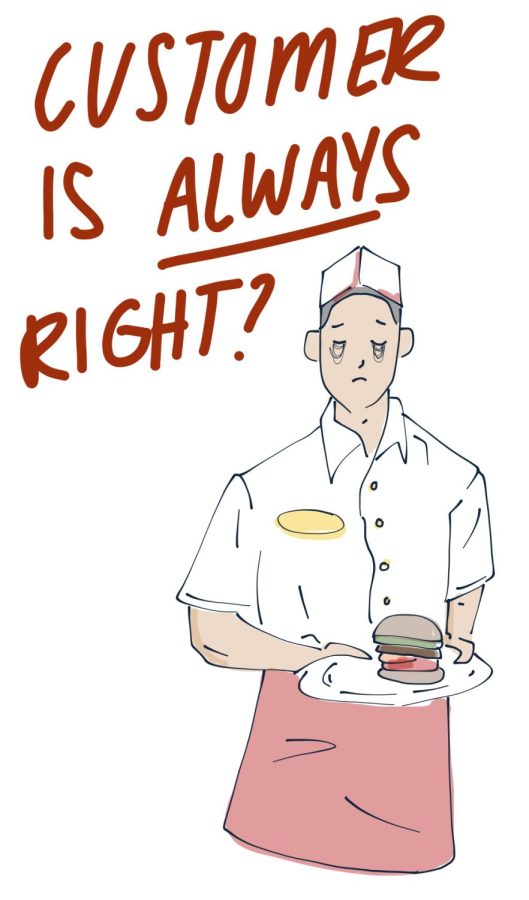OPINION: The customer is not always right
Numerous restaurant workers undergo verbal abuse and name calling which is damaging to their mental health.
Peering past the glass exterior in broad daylight, a person tapes a sign up against a restaurant window. “Now Hiring” and “Help Wanted” are messages haunting numerous eateries. Amid the COVID-19 pandemic, a nationwide shortage of restaurant workers is disrupting the balance of the food industry. The issue, however, stretches far beyond the surface: it reveals the exploitative nature of the industry that traps restaurant workers.
Employers are a fundamental cause to the continuous unhealthy working cycle of the industry. Many employers establish absurdly long shifts for employees to work while squeezing in limited time for a break, or none at all. According to a 2019 study by Paychex, a human resources outsourcing services provider, over 80 percent of employees in food service and hospitality reported feeling burnt out from their workload. Undoubtedly, employees are putting their physical and mental wellbeing at risk of burnout that is heightened by an unstable workplace. In terms of leadership, managers should not overlook burnout and rather promote opportunities and resources for workers to turn to in moments of distress.
The position of working in the food service industry is seen as scraping at the bottom of the barrel, but the reality highlights an intense pressure on workers in a fast-moving environment with little pay in return. Pay disparities are impacted by the industry’s enduring practice of paying workers subminimum wage in addition to dependency on tips. According to a study conducted by researchers at Restaurant Opportunities Centers, an advocacy group, and Race Forward, a racial justice nonprofit, workers of color in the Bay Area are paid $6 less an hour on average compared to their white counterparts. This difference is mainly caused by workers of color being heavily employed in casual restaurants and underrepresented in higher paying, visible positions in fine dining institutions. While it is a diverse industry, inequity remains and leaves workers feeling powerless and incapable of achieving promotional opportunities. Employers need to be more conscious of potential bias when hiring a team and emphasize a healthy work-life balance.
A clear rift in relationships are found between workers and inconsiderate, aggressive customers who are large contributors to the diminishing quality of workers’ mental health. According to the SDA, a union defending the rights of employees in retail, fast food and distribution industries, over 85 percent of retail and fast food workers surveyed had been subjected to verbal abuse by customers. Entitled customers breach the comfort of workers and preach the adage “the customer is always right.” Yet making impatient demands, muttering insults and throwing a temper tantrum at the register are not justifiable actions solely when personal expectations are not met. The customer is not always right, and workers deserve to have their boundaries respected.
A long-standing culture revolves around hospitality and oftentimes sacrificing oneself to provide outstanding service for the comfort of the guests. Derogatory name-calling is a common occurrence for workers who are trying to cater to the needs of entitled customers. Many restaurant workers are heavily reliant on tips and feel forced to accept dehumanizing comments in exchange for their survival. Institutions need to commit to improvements in defending workers’ safety from customer harassment and curate a healthier environment to work in.
A new problem has emerged into discussion after workers left the industry to pursue their own interests. Hidden behind the curtains is a pervasive issue of sexual harassment affecting women from entering the restaurant industry. According to a 2021 survey by the Social Science Research Solutions, over 70 percent of female restaurant workers had been sexually harassed at least once during their careers. In a prominent sector, women are subjected to being overly sexualized by perpetrators including employers, coworkers and customers. For women, the complicated struggle to report cases comes at a cost. By not accepting sexual advances, women are vulnerable to retaliation by managers who are in control of their hours and pay. Similarly, confronting unwanted sexual behavior from customers puts workers at risk of losing tips that cover necessities. To challenge this dangerous trend, witnesses and managers should step in. Supporting victims will empower them to protect themselves and feel more comfortable to speak up.
The restaurant industry needs to be restructured for restaurant workers. By providing accessibility to flexible services and employee benefits, workers will want to return to a livelier culture brewing with opportunities. There is a gleaming sliver of hope to break a cycle designed for exploitation. One needs to recognize that workers are more than a service for customers. They are humans too.


